1061 scholarly books by Catholic University of America Press and 37
start with D
1061 scholarly books by Catholic University of America Press and 37
1061 scholarly books by Catholic University of America Press
37 start with D start with D
37 start with D start with D
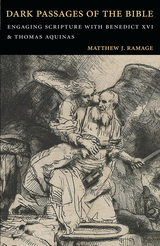
Dark Passages of the Bible
Matthew J. Ramage
Catholic University of America Press, 2013
Following the lead of Pope Benedict XVI, in Dark Passages of the Bible Matthew Ramage weds the historical-critical approach with a theological reading of Scripture based in the patristic-medieval tradition. Whereas these two approaches are often viewed as mutually exclusive or even contradictory, Ramage insists that the two are mutually enriching and necessary for doing justice to the Bibles most challenging texts.
[more]
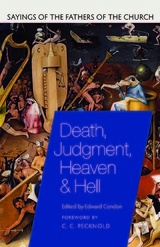
Death, Judgement, Heaven, and Hell
Edward Condon
Catholic University of America Press, 2019
In this volume, canon lawyer and writer Edward Condon compiles a book full of wisdom and compelling insights. More than anything, the Fathers warn us that our life is short, and the reckoning for how we have lived it eternal. The urgency of the Church’s message, brought to life in the sayings of the Fathers, comes to remind us of our true calling and inheritance in baptism, and of the richness of the heavenly reward, which is not so much the fruit of our efforts on Earth but the fulfillment of God’s promise of love to us. The terror of hell is not the threat of the dictator, but a dire warning of the true scope of our freedom as children of God.
[more]
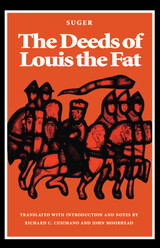
The Deeds of Louis the Fat
Abbot of Saint Denis, Suger
Catholic University of America Press, 1992
No description available
[more]
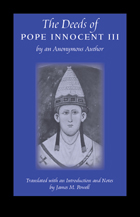
The Deeds of Pope Innocent III
James M. Powell
Catholic University of America Press, 2004
The Deeds of Pope Innocent III, composed before 1210 by an anonymous member of the papal curia, provides a unique window into the activities, policies, and strategies of the papacy and the curia during one of the most important periods in the history of the medieval church.
[more]
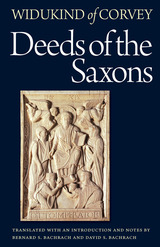
Deeds of the Saxons
Widukind of Corvey
Catholic University of America Press, 2014
PleWidukind, a monk at the prominent monastery of Corvey in Saxony during the middle third of the tenth century, is known to posterity through his Res gestae Saxonicae, an exceptionally rich account of the Saxon people and the reigns of the first two rulers of the Ottonian dynasty, Henry I (919-936) and Otto I (936-973). Widukind, likely of noble birth, received a thorough education in both biblical and classical texts. When writing the Gestae, Widukind also had available the extensive library at Corvey, with its large collection of ancient texts as well as numerous works from the eighth and ninth centuries. Widukind drew on these, and even more contemporary written sources to complement and inform orally transmitted information that he received from many sources including people closely associated with the Ottonian royal court. Widukind wrote the Res gestae from the 950s to the 970s, incorporating additional material as he obtained further information and as major new events took place in the German kingdom and beyond. After providing a historical background for the Saxon people Widukind devotes most of his attention to the political and military affairs of the German kingdom, concentrating heavily on affairs of the royal court. Widukind provides information that can be found in no other source. His close relationship with the royal court enabled him to provide an "insider's" view of the people and events that shaped the political and military history of the most powerful kingdom in Europe. As a consequence, the Res gestae is an indispensable account for the history of the German kingdom during the tenth century. Bernard S. Bachrach and David S. Bachrach provide an introduction to the text that contextualizes the author, his historical methods, and the information that he provides. They draw on a large number of other written sources of information, including both narrative works and the political, economic, social, and military affairs of the day, and provide an extensive apparatus of notes.
ase fill in marketing copy
[more]
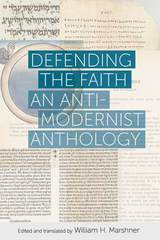
Defending the Faith
William H. Marshner
Catholic University of America Press, 2016
At the dawn of the 20th Century, several writers who were to become famous under the title of "Modernists" were advancing a deep agenda for reform in the faith and praxis of the Roman Catholic Church. But their agenda met with serious and scholarly opposition from another group of writers, whose essays are here made available in English. They include the historian and university rector Pierre Battifol, the biblical exegete M.J. Lagrange, OP, the Jesuit historical theologians Eugène Portalié and Léonce de Grandmaison, and the philosophers Eugène Franon and Joannès Wehrlé. All welcomed the historico-critical methods of research, and far from thinking them fatal to orthodoxy (as the Modernists did), they thought the Church's faith would survive and be strengthened by rigorous scholarship. These thinkers, then, are the true predecessors of Pius XII (Divino afflante Spiritu) and Vatican II (Dei Verbum). At the same time, these men thought outside the boxes drawn by 19th Century Positivism (Loisy), anti-intellectualist pragmatism (LeRoy), and romantic mysticism (Tyrrell). Their concerns hold new significance in the light of John Paul II's 1990 encyclical Fides et Ratio. Reading these too-long forgotten writers, then, deepens in a new way one's understanding of the Catholic Church's decision to decline and even condemn the Modernists' agenda, whether one ultimately applauds that decision or deplores it.
[more]
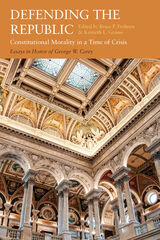
Defending the Republic
Constitutional Monarchy in a Time of Crisis: Essays in Honor of George W. Carey
Bruce Frohnen
Catholic University of America Press, 2022
In recent years, our constitutional order has increasingly come under attack as irredeemably undemocratic, racist, and oppressive. At the same time, it is increasingly obvious that politic practices in the United States have strayed very far from the founders’ designs and become deeply dysfunctional. The time is thus ripe for renewed reflection about the American political tradition.
This volume reintroduces readers to the conservative tradition of political and constitutional discourse. It brings together prominent political scientists and legal scholars, all of whom were deeply influenced by the life and work of the eminent constitutional scholar George W. Carey. For over 40 years, Carey strove mightily to explain the nature and requirements of our political tradition. How it fostered meaningful, virtuous self-government, and how our constitutional tradition has been derailed by progressivist ideology. He is perhaps best known for his concept of “constitutional morality,” the understanding that our republican constitutional order can be sustained only by a combination of formal mechanisms (e.g., separation of powers) and unwritten norms (“standards of behavior”) that act to foster deliberation and consensus, as well as keep political actors within the boundaries of their constitutional offices.
Contributors, including Francis Canavan, Claes G. Ryn, Paul Edward Gottfried, and Peter Augustine Lawler, discuss and develop Carey’s key insights, applying them to issues from the nature of majoritarian government to the purposes of constitutionalism to the decline of virtue that has accompanied the expansion of power among national and international elites. Each essay provides penetrating analysis of key aspects of our tradition, its inherent purposes, growth, and subsequent derailment, as well as the resources remaining within that tradition for the rebuilding of our constitutional order and a decent common life.
[more]
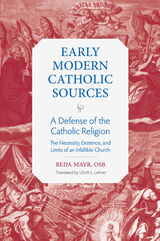
A Defense of the Catholic Religion
The Necessity, Existence, and Limits of an Infallible Church
Beda Mayr, OSB
Catholic University of America Press, 2023
The Benedictine Beda Mayr,OSB, (1742–1794) was one of the main figures of the German Catholic Enlightenment. He was not only the first Catholic to wrestle with the challenges of Reimarus and Lessing, but also the first to develop an ecumenical methodology for a reunion of the churches. The text, translated from the German original for the first time, presents a theologian who intentionally went to the margins of orthodoxy in order to allow for more interconfessional dialogue. Mayr argued that Catholic theology should follow minority opinions for unsettled dogmatic questions, which would allow for easier union agreements with Protestant churches. Moreover, he suggested limiting ecclesial infallibility to directly revealed truths, thereby reducing the authoritative truth claims of conciliar or papal decisions.
Although the study of Catholic Enlightenment is booming among historians and theologians, too few texts are available in reliable translations. A major strength of this edition is not only that its introduction introduces the reader to the colorful landscape of eighteenth-century theological discussions, but also presents the entire text of Mayr's book (with the exception of its appendix) thereby allowing the reader to see the strengths and weaknesses of Enlightenment ecumenism.
Mayr's Limited Infallibility was put on the Index of Forbidden Books, on which it remained until the 20th Century. It invites readers to a modern, non-scholastic way of theologizing for the sake of Christian unity.
[more]

Defining Platonism
John F. Finamore
Catholic University of America Press, 2017

Deification in the Latin Patristic Tradition
Jared Ortiz
Catholic University of America Press, 2019
It has become a commonplace to say that the Latin Fathers did not really hold a doctrine of deification. Indeed, it is often asserted that Western theologians have neglected this teaching, that their occasional references to it are borrowed from the Greeks, and that the Latins have generally reduced the rich biblical and Greek Patristic understanding of salvation to a narrow view of redemption. The essays in this volume challenge this common interpretation by exploring, often for the first time, the role this doctrine plays in a range of Latin Patristic authors.
[more]
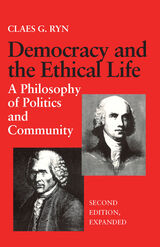
Democracy and the Ethical Life
A Philosophy of Politics and Community (Second Edition, Expanded)
Claes G. Ryn
Catholic University of America Press, 1990
This study goes to the heart of ethics and politics. Strongly argued and lucidly written, the book makes a crucial distinction between two forms of democracy
[more]
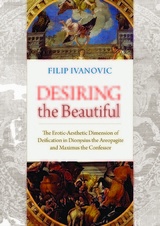
Desiring the Beautiful
Filip Ivanovic
Catholic University of America Press, 2019
Desiring the Beautiful studies the concept of deification, theosis, in two of the most influential early Christian philosopher-theologians, who might be considered as theoretical consolidators of the idea of theosis, and argues that the proper understanding of their central soteriological concept must take into account its dimension of love and beauty.
[more]
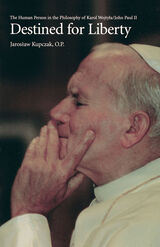
Destined for Liberty
The Human Person in the Philosophy of Karol Wojtyla/John Paul II
Jaroslaw Kupczak, O.P.
Catholic University of America Press, 2000
In this compelling new work, Jaroslaw Kupczak, O.P., presents a complete introduction to John Paul II's theory of the human person
[more]
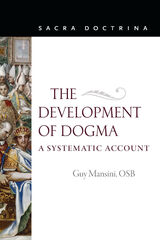
The Development of Dogma
A Systematic Account
Guy Mansini, OSB
Catholic University of America Press, 2023
The Development of Dogma examines the nature of dogmatic statements and the causes of development. It devotes particular attention to the emergence of the form of dogmatic statements at the Council of Nicaea, but notes how this form is anticipated in the New Testament. It situates dogma and its development within the matrix of the great fundamental theological realities of Scripture, Tradition, and Magisterium. Fr. Mansini examines at some length how the Church comes to recognize a development as a genuine development rather than as a distortion of the word of God. The Development of Dogma is especially valuable today for its discussion and defense of the philosophical presuppositions of dogma, which are often simply presupposed but should not be ignored in a complete account of development. These presuppositions touch on fundamental philosophical issues, including the nature of knowledge, the objectivity and trustworthiness of names, and the various logical forms employed in understanding how development is related to a closed revelation. The historicity of human knowledge is also addressed, and the role of dogma itself in heading off the extreme relativism the historical nature of man is supposed to imply for ecclesial faith and life. The Church's dogma about dogma enunciated at the First Vatican Council is also examined. The role of certain fundamental concepts in understanding the possibility of the irreformability of dogma it speaks of is expressly addressed—concepts in principle accessible to all human beings and that enable a trans-cultural, trans-temporal proposal and reception of revealed truth.
[more]
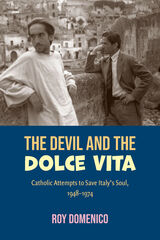
The Devil and the Dolce Vita
Catholic Attempts to Save Italy's Soul, 1948-1974
Roy Domenico
Catholic University of America Press, 2021
Italy’s economic expansion after World War Two triggered significant social and cultural change. Secularization accompanied this development and triggered alarm bells across the nation’s immense Catholic community. The Devil and the Dolce Vita is the story of that community – the church of Popes Pius XII, John XXIII and Paul VI, the lay Catholic Action association, and the Christian Democratic Party – and their efforts in a series of culture wars to preserve a traditional way of life and to engage and tame the challenges of a rapidly modernizing society.
Roy Domenico begins this study during the heady days of the April 1948 Christian Democratic electoral triumph and ends when pro-divorce forces dealt the Catholics a defeat in the referendum of May 1974 where their hopes crashed and probably ended. Between those two dates Catholics engaged secularists in a number of battles – many over film and television censorship, encountering such figures as Roberto Rossellini, Luchino Visconti, Federico Fellini, and Pier Paolo Pasolini. The Venice Film Festival became a locus in the fight as did places like Pozzonovo, near Padua, where the Catholics directed their energies against a Communist youth organization; and Prato in Tuscany where the bishop led a fight to preserve church weddings. Concern with proper decorum led to more skirmishes on beaches and at resorts over modest attire and beauty pageants. By the 1960s and 1970s other issues, such as feminism, a new frankness about sexual relations, and the youth rebellion emerged to contribute to a perfect storm that led to the divorce referendum and widespread despair in the Catholic camp.
[more]
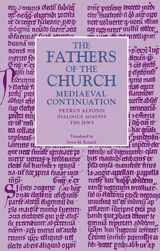
Dialogue against the Jews
Petrus Alfonsi
Catholic University of America Press, 2006
Never before translated into English, this work presents to the reader perhaps the most important source for an intensifying medieval Christian-Jewish debate.
[more]
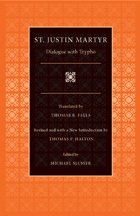
Dialogue with Trypho (Selections from the Fathers of the Church, Volume 3)
Saint Justin Martyr
Catholic University of America Press, 2003
No description available
[more]
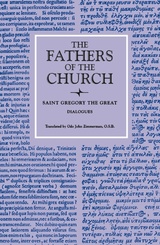
Dialogues
Saint Gregory the Great
Catholic University of America Press, 1959
No description available
[more]
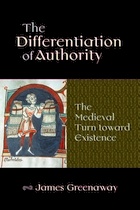
The Differentiation of Authority
The Medieval Turn toward Existence
James Greenaway
Catholic University of America Press, 2012
In this study, James Greenaway explores the philosophical continuity between contemporary Western society and the Middle Ages. Allowing for genuinely modern innovations, he makes the claim that the medieval search for order remains fundamentally unbroken in our search for order today.
[more]
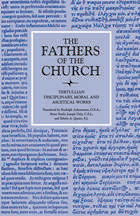
Disciplinary, Moral, and Ascetical Works
Tertullian
Catholic University of America Press, 1959
No description available
[more]
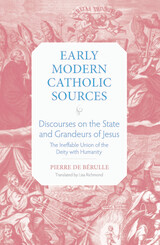
Discourse on the State and Grandeurs of Jesus
The Ineffable Union of the Diety with Humanity
Pierre de Bérulle
Catholic University of America Press, 2023
Pierre de Bérulle (1575–1629) is one of the foremost personalities of early modern Catholicism. As the founder of the “French school” of spirituality, he has exercised a profound influence on the Church from the seventeenth century to the present day. Until now, however, very little of Bérulle’s writings have been available in English. This volume provides the first complete English translation of his best-known work, first printed in Paris in 1623 and titled Discourses on the State and Grandeurs of Jesus, by the Ineffable Union of the Deity with Humanity, and the Submission and Servitude that Is Due Him and His Most Holy Mother in Response to This Wondrous State. Composed in his maturity, this work expresses Bérulle’s theology of the Man-God, whose self-emptying has enabled us to become “capable” of God.
In contrast to other spiritual writers who taught that mystical union with God follows the extinction of all sensory and conceptual awareness and all activity of willing, Bérulle’s focus is on the faithful soul’s participation in what he calls Jesus’ “states,” or inner dispositions. The state that Bérulle describes and honors supremely in this text is Jesus’ state of self-emptying in the mystery of the Incarnation. In the hypostatic union, our humanity in Christ is lifted up to heaven, and Christ is the first fruit of humanity-made-divine, the “firstborn among many brothers.” Through him we become children of God by adoption, participants in God’s divine being.
This is an outstanding translation, conveying not only the meaning but also the beauty and rhetorical features of the original. The Discourses will repay reading as a poignant source of personal devotion, a primary text of the Catholic Reformation, and a classic of spiritual theology.
[more]
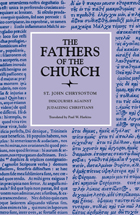
Discourses against Judaizing Christians
Saint John Chrysostom
Catholic University of America Press, 1979
No description available
[more]
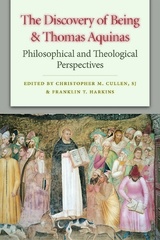
The Discovery of Being and Thomas Aquinas
Christopher M. Cullen, SJ
Catholic University of America Press, 2019
While there has been agreement among followers of Aquinas that being insofar as it is being (being qua being) is the subject of metaphysics, there is not agreement on how this being qua being is to be understood, nor on how we come to know the being that is the object of metaphysical investigation. The topic of what being is, as the object of the science of metaphysics, and how to account for the “discovery” of the being of metaphysics have emerged as central problems for the contemporary retrieval of Aquinas and for the larger project of post-Leonine Thomism in general. This lack of agreement has hampered the retrieval of Aquinas’s metaphysics.
The collection of essays within The Discovery of Being and Thomas Aquinas is divided into three major parts: the first set of essays concerns the foundation of metaphysics within Thomism; the second set exemplifies the use of metaphysics in fundamental philosophical issues within Thomism; and the third set employs metaphysics in central theological issues.
The Discovery of Being and Thomas Aquinas allows major scholars of the different types of Thomism to engage in a full-scale defense of their position, as well as expanding Thomistic metaphysics to the discipline of theology in important ways.
The collection of essays within The Discovery of Being and Thomas Aquinas is divided into three major parts: the first set of essays concerns the foundation of metaphysics within Thomism; the second set exemplifies the use of metaphysics in fundamental philosophical issues within Thomism; and the third set employs metaphysics in central theological issues.
The Discovery of Being and Thomas Aquinas allows major scholars of the different types of Thomism to engage in a full-scale defense of their position, as well as expanding Thomistic metaphysics to the discipline of theology in important ways.
[more]
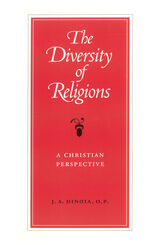
The Diversity of Religions
A Christian Perspective
J. A. DiNoia, O.P.
Catholic University of America Press, 1992
DiNoia approaches the debate in the theology of religions with a fresh, lucid, critical and informed mind. . . . This book is timely, provocative and explores new territories and recasts old debates in a fresh and intelligent manner. It will appeal to philosophers, theologians, indologists and those concerned with the meeting of Christianity and the world religions.--Gavin D'Costa, University of Bristol
[more]
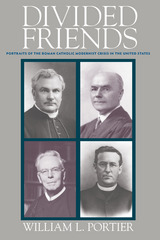
Divided Friends
William L. Portier
Catholic University of America Press, 2013
In two sets of intertwined biographical portraits, spanning two generations, Divided Friends dramatizes the theological issues of the modernist crisis, highlighting their personal dimensions and extensively reinterpreting their long-range effects. The four protagonists are Bishop Denis J. O?Connell, Josephite founder John R. Slattery, together with the Paulists William L. Sullivan and Joseph McSorley. Their lives span the decades from the Americanist crisis of the 1890s right up to the eve of Vatican II. In each set, one leaves the church and one stays. The two who leave come to see their former companions as fundamentally dishonest. Divided Friends entails a reinterpretation of the intellectual fallout from the modernist crisis and a reframing of the 20th century debate about Catholic intellectual life.
[more]

Divine Fruitfulness
A Guide through Balthasar's Theology beyond the Trilogy
Aidan Nichols
Catholic University of America Press, 2007
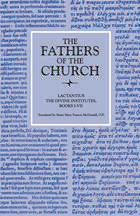
The Divine Institutes, Books I–VII
Lactantius
Catholic University of America Press, 1964
No description available
[more]
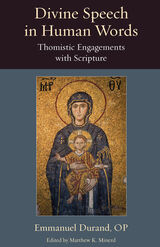
Divine Speech in Human Words
Thomistic Engagements with Scripture
Emmanuel Durand, OP
Catholic University of America Press, 2022
Is the portrait of God revealed in Scripture fundamentally intelligible? The biblical accounts of God reveal seemingly contradictory themes: God’s holiness and narratives telling of his anger; the Divine Omnipotence faced with the Impossible; the suffering Christ upon the Cross and the transcendent Trinity of Persons in God; the unique Savior and the universality of God’s salvific will; and so forth. How are we to hold together all of this data without denying any aspect of the mystery of God? Must we give into our ambient culture’s sense that the biblical God cannot be taken seriously by truly discerning and rational minds when they try to understand “the Divine”? Or, in the midst of this apparent contradiction, can we find the lines of harmony in the revealed mysteries?
In Divine Speech in Human Words, Fr. Emmanuel Durand unties some of the knots that face us when we reflect on the God of biblical Revelation. In each of the essays gathered here, Fr. Durand sympathetically articulates the tensions and apparent contradictions experienced by contemporary minds as they strive to understand the revealed truth of God. A whole host of topics are covered in this volume: the Cross and the revelation of the Trinity; God’s holiness and transcendence; divine immutability and the sorrow of a loving God; Divine Providence and human prayer; the fatherhood of God and eschatology; Christ’s way of life; and many others.
Drawing philosophical insights from the Thomistic tradition as his intellectual tools, Fr. Durand nonetheless emphasizes the importance of a properly theological mode of reflection, allowing these issues to be illuminated by the revealed truth of Sacred Scripture. Thus, for each of these difficult topics, he shows that a vital theological response must not limit itself to mere logical rigor but, rather, requires metaphysical insight and, above all, sapiential appreciation of God’s revealed word. With such instruments in hand, each essay approaches the tensions of biblical revelation with an eager readiness to show how a thoughtful Thomistic practice of biblical theology can guide faith as it seeks an understanding of both contemporary and perennial theological problems.
[more]
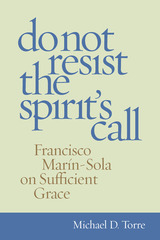
Do Not Reisist the Spirit's Call
Michael D. Torre
Catholic University of America Press, 2013
In this book, Michael D. Torre makes Marín-Sola's articles available in English for the first time. The articles are preceded by an introduction on Marín-Sola and followed by a conclusion that traces the reception of his thought within the Catholic theological community. In Torre's afterword, he defends Marín-Sola's position as substantively the same as that of Aquinas.
[more]
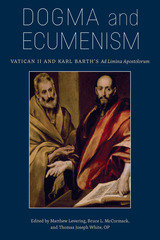
Dogma and Ecumenism
Vatican II and Karl Barth's 'Ad Limina Apostolorum'
Matthew Levering
Catholic University of America Press, 2020
The conversation of this book is structured around five major documents from the Second Vatican Council, each of which Barth commented upon in his short but penetrating response to the Council, published as Ad Limina Apostolorum. In the two opening essays, Thomas Joseph White reflects upon the contribution that this book seeks to make to contemporary ecumenism rooted in awareness of the value of dogmatic theology; and Matthew Levering explores the way in which Barth’s Ad Limina Apostolorum flows from his preconciliar dialogues with Catholic representatives of the nouvelle théologie and remain relevant to the issues facing Catholic theology today. The next two essays turn to Dei Verbum, the Dogmatic Constitution on Divine Revelation; here Katherine Sonderegger (Protestant) reflects on scripture and Lewis Ayres (Catholic) reflects on tradition. The next two essays address the Dogmatic Constitution on the Church, Lumen Gentium, which touches upon central differences of Catholic and Protestant self-understanding. Christoph Schwöbel (Protestant) analyzes visible ecclesial identity as conceived in a Protestant context, while Thomas Joseph White (Catholic) engages Barth’s Reformed criticisms of the Catholic notion of the Church. The next two essays take up Nostra Aetate: Bruce Lindley McCormack (Protestant) asks whether it is true to say that Muslims worship the same God as Christians, and Bruce D. Marshall (Catholic) explores the implications of the Council’s reflections on the Jewish people. The next two essays take up the Pastoral Constitution on the Church in the Modern World, Gaudium et Spes: John Bowlin (Protestant) makes use of the thought of Aquinas to consider the promise and perils of the document, while Francesca Aran Murphy (Catholic) engages critically with George Lindbeck’s analysis of the document. The next two essays explore Unitatis Redintegratio: Hans Boersma (Protestant) asks whether the ecumenical intention of the document is impaired by its insistence that the unity of the Church is already present in the Catholic Church, and Reinhard Hütter (Catholic) systematically addresses Barth’s questions regarding the document. The noted ecumenist and Catholic theologian Richard Schenk brings the volume to a close by reflecting on “true and false ecumenism” in the post-conciliar period.
[more]
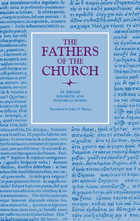
Dogmatic and Polemical Works
Saint Jerome
Catholic University of America Press, 1965
St. Jerome's reputation rests primarily on his achievements as a translator and as a scriptural exegete. The important service that he rendered to the Church in his doctrinal works is often overlooked or minimized by those who look for originality and independence of thought
[more]
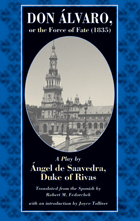
Don Álvaro, or, The Force of Fate
Ángel de Saavedra
Catholic University of America Press, 2005
In this English edition designed for either classroom use or performance, Robert Fedorchek presents a readable translation faithful to the tone and spirit of the original.
[more]
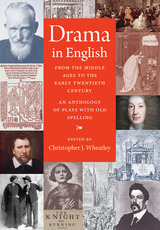
Drama in English From the Middle Ages to the Early Twentieth Century
Christopher J. Wheatley
Catholic University of America Press, 2016
At a time when good editions of drama in English are prohibitively expensive and online texts are unedited and lack the apparatus necessary for students to understand and contextualize the plays, this anthology affordably illustrates every significant genre of drama in the English language from the late fourteenth century to the early twentieth century, with plays from England, Ireland, and the United States of America. The mystery and morality plays of the Middle Ages, Renaissance comedy, tragedy and meta-theater, Restoration and eighteenth-century comedy, tragedy, and ballad opera, nineteenth-century melodrama, and early twentieth century realism and naturalism are all presented with the introductions glossaries and notes suitable for a college level reader by an editor with a quarter of a century of experience teaching courses on the history of drama in English. The plays both reflect their times and critique them, while remaining stageable today. The Wakefield Master, The York Realist, Marlowe, Jonson, Dryden, Wycherley, Gay, Boucicault, Synge, and Shaw are some of the playwrights in this representative collection of plays that reveal both the popular appeal of the English-language theater and the dazzling dramatic artistry it embodied over a period of six centuries. Further the collection is in "old spelling" and is thus a useful sourcebook for those interested in the history of the English language.
[more]
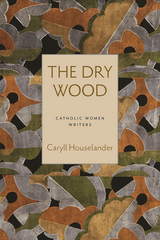
The Dry Wood
Caryll Houselander
Catholic University of America Press, 2021
In the English-speaking world, the Catholic Literary Revival is typically associated with the work of G. K. Chesterton/Hilaire Belloc, Evelyn Waugh and Graham Greene. But in fact the Revival’s most numerous members were women. While some of these women remain well known⎯Muriel Spark, Antonia White, Flannery O’Connor, Dorothy Day - many have been almost entirely forgotten. They include: Enid Dinnis, Anna Hanson Dorsey, Alice Thomas Ellis, Eleanor Farjeon, Rumer Godden, Caroline Gordon, Clotilde Graves, Caryll Houselander, Sheila Kaye-Smith, Jane Lane, Marie Belloc Lowndes, Alice Meynell, Kathleen Raine, Pearl Mary Teresa Richards, Edith Sitwell, Gladys Bronwyn Stern, Josephine Ward, and Maisie Ward.
There are various reasons why each of these writers fell out of print: changes in the commercial publishing world after World War II, changes within the Church itself and in the English-speaking universities that redefined the literary canon in the last decades of the 20th century. Yet it remains puzzling that a body of writing so creative, so attuned to its historical moment, and so unique in its perspective on the human condition, should have fallen into obscurity for so long.
The Catholic Women Writers series brings together the English-language prose works of Catholic women from the 19th and 20th centuries; work that is of interest to a broad range of readers. Each volume is printed with an accessible but scholarly introduction by theologians and literary specialists.
The first volume in the series is Caryll Houselander’s The Dry Wood. Houselander is known primarily for her spiritual writings but she also wrote one novel, set in a post-war London Docklands parish. There a motley group of lost souls are mourning the death of their saintly priest and hoping for the miraculous healing of a vulnerable child whose gentleness in the face of suffering brings conversion to them all in surprising and unexpected ways. The Dry Wood offers a vital contribution to the modern literary canon and a profound meditation on the purpose of human suffering.
[more]
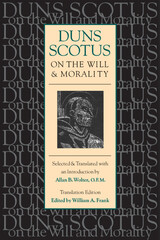
Duns Scotus on the Will and Morality
John Duns Scotus
Catholic University of America Press, 1997
No description available
[more]
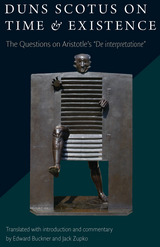
Duns Scotus on Time and Existence
John Duns Scotus
Catholic University of America Press, 2014
An English translation of John Duns Scotus's The Questions on Aristotle's "De Interpretatione" including an extensive commentary on some of Scotus's more difficult ideas.
[more]
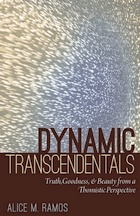
Dynamic Transcendentals
Truth, Goodness, and Beauty from a Thomistic Perspective
Alice M. Ramos
Catholic University of America Press, 2012
Addressing contemporary interest in the relationship between metaphysics and ethics, as well as the significance of beauty for ethics, Alice Ramos presents an accessible study of the transcendentals and provides a dynamic rather than static view of truth, goodness, and beauty.
[more]
READERS
Browse our collection.
PUBLISHERS
See BiblioVault's publisher services.
STUDENT SERVICES
Files for college accessibility offices.
UChicago Accessibility Resources
home | accessibility | search | about | contact us
BiblioVault ® 2001 - 2024
The University of Chicago Press









